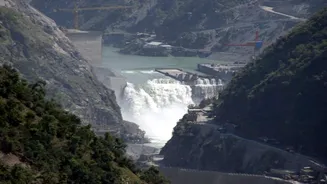Human-Caused Catastrophes
The planet has witnessed numerous natural disasters, some of which were directly caused by human actions. These events serve as stark reminders of the
detrimental effects of negligence, poor planning, and a lack of environmental awareness. The consequences of these human-caused disasters have been far-reaching, affecting ecosystems, economies, and human lives. Studying these incidents offers crucial insights into how to prevent similar tragedies in the future. Careful analysis of such events underlines the necessity of responsible practices and comprehensive environmental management to mitigate future risks and safeguard the planet's health. Addressing the root causes of these events, such as deforestation, pollution, and unsustainable resource management, is a crucial step. Taking lessons from the past and applying them to present-day challenges is an essential part of the journey towards a more sustainable future.
Deforestation's Deadly Impact
Deforestation is a significant contributor to human-caused disasters. Clearing forests for agriculture, logging, and urbanization eliminates natural barriers that protect against floods and landslides. Trees absorb water, and their roots stabilize soil, reducing the risk of erosion and mass movements. When forests are destroyed, the land becomes vulnerable, leading to increased runoff during heavy rains. This can cause devastating floods, as the water has nowhere to go, and landslides, as the soil loses its stability. Deforestation also leads to climate change, exacerbating extreme weather events. Without the protective cover of trees, the soil erodes, leading to a loss of fertile land and habitat destruction. This can trigger a cascade of negative consequences for ecosystems, economies, and human communities. Consequently, managing forests sustainably is vital to lessen the risk of natural disasters.
Pollution's Destructive Force
Pollution is a major factor contributing to natural disasters. Industrial waste, chemical spills, and improper disposal of hazardous materials contaminate land and water sources, harming ecosystems and human health. Polluted waterways can contribute to flooding, as the contamination can disrupt natural drainage patterns and hinder water absorption. Furthermore, pollution can degrade the quality of soil and water, reducing their ability to support plant life and leading to erosion. Air pollution is another significant concern. It can worsen climate change by increasing greenhouse gas emissions, thereby contributing to more frequent and intense storms, droughts, and wildfires. Dealing with pollution, including effective waste management, strict industrial regulations, and cleaner energy sources, is a fundamental aspect of disaster prevention. Proper disposal methods are essential, along with policies designed to reduce pollution.
Unsustainable Practices
Unsustainable agricultural and resource extraction practices are linked to several natural disasters. Overgrazing and intensive farming methods can deplete soil nutrients, making land more susceptible to erosion and desertification. Mining operations, especially open-pit mining, can drastically alter landscapes, destabilize slopes, and pollute water sources. Over-extraction of groundwater can lead to land subsidence, increasing the risk of floods and structural damage. These actions damage the environment and amplify disaster risks. The use of unsustainable practices is often driven by short-term economic gains, ignoring the long-term environmental consequences. These actions harm ecosystems, and human communities, by contributing to the degradation of soil, water and air quality. Shifting towards sustainable practices, such as conservation agriculture, responsible mining, and ecosystem restoration, is critical. It requires a combination of government policies, corporate responsibility, and public awareness to promote resource conservation and mitigate disaster risks.
Climate Change's Role
Human activities are significantly altering the climate, leading to more extreme weather events. The burning of fossil fuels, deforestation, and industrial processes release greenhouse gases into the atmosphere, trapping heat and causing global temperatures to rise. This increase in temperature contributes to sea-level rise, intensified storms, droughts, and other climate-related disasters. Changes in precipitation patterns lead to increased flooding in some regions and prolonged droughts in others. Rising sea levels threaten coastal communities and ecosystems, while more intense storms cause widespread destruction. Climate change further amplifies the effects of existing environmental vulnerabilities, worsening the impacts of human-caused disasters. Mitigating climate change requires a worldwide effort to reduce greenhouse gas emissions, increase energy efficiency, and promote sustainable practices. Adaptation measures, such as building climate-resilient infrastructure and implementing early warning systems, are crucial for reducing the risks.
Foresight and Responsibility
Avoiding future human-caused disasters demands foresight and a commitment to responsible practices. Governments, industries, and individuals must work together to implement and enforce environmental regulations, promote sustainable practices, and invest in research and development of disaster-resistant technologies. Prioritizing the conservation of natural resources, reducing pollution, and addressing climate change are critical. Education and public awareness play a vital role in fostering a culture of environmental stewardship. Implementing these measures requires a significant shift in the way societies value the environment. Making informed decisions, planning for the future, and taking proactive steps to mitigate environmental risks are all fundamental to preventing future disasters. This will ensure the well-being of both present and future generations. Focusing on solutions, rather than focusing solely on the problems, is vital.











